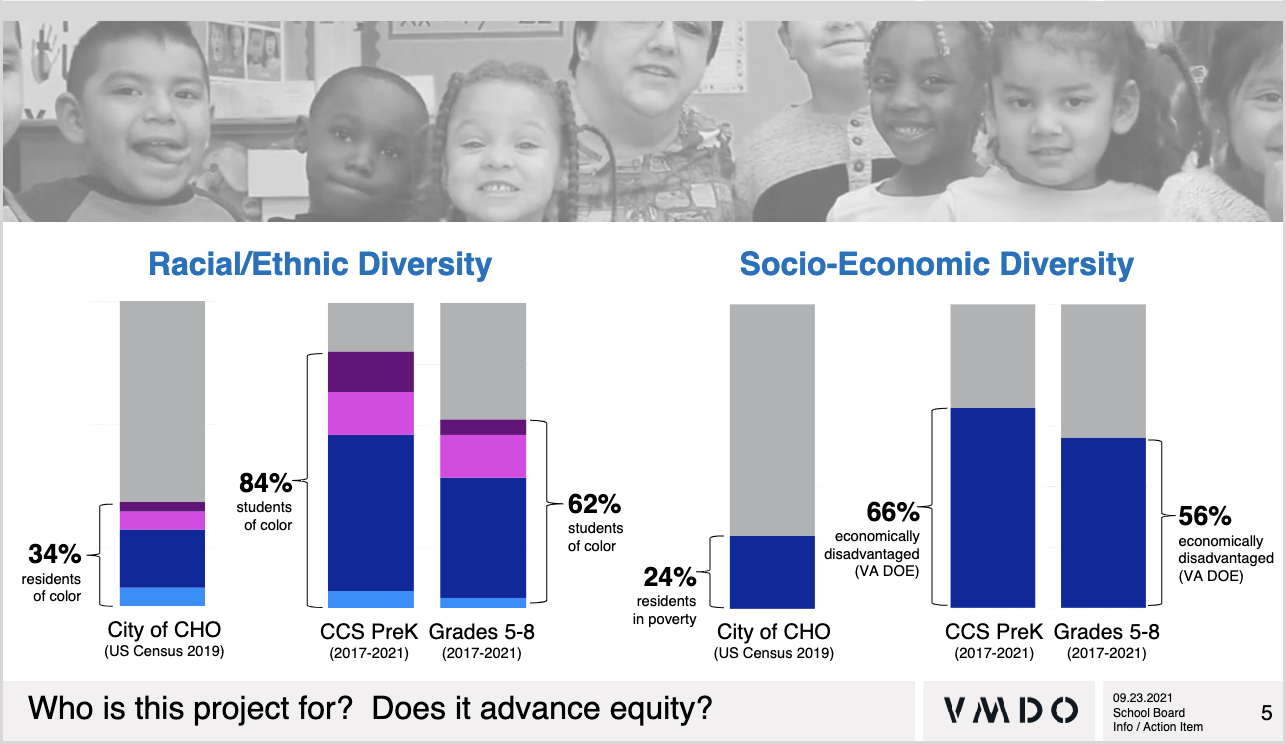Invest in long-term public education:
The foundation of a thriving community is investing in children through the public school system. Students deserve a high-quality education regardless of where they live or their family’s income. Public education is key to strengthening the economy and therefore our community. Our students are bright and capable of achieving many things but deserve equitable social infrastructure. Charlottesville needs to make a solid investment in school facilities, educators, instructional learning, health, and the community to take care of our youngest residents.
As noted in the New York Times in 2018, “the city has not fully come to terms with another aspect of its Jim Crow legacy: a school system that segregates students from the time they start, and steers them into separate and unequal tracks.”
Equity is not a word that should be thrown around like a football. The city needs to recognize that not every student starts at the same place. Every experience a child has will impact their well-being, how they learn, and determine their ability to thrive inside and outside the classroom.
It’s on us – the adults responsible for being their champions – to make sure they have everything to be successful.
To move Charlottesville City Schools forward:
Prioritize equitable investments to address historic inequities. Nearly half (46%) of all students enrolled in public schools are economically disadvantaged. The majority of students at CCS are students of color, where Buford and Walker serve the highest percentage of Black, Brown, and economically disadvantaged students across the entire school district. We are looking at a history of discrimination and disinvestments that lead to learning gaps across race and income.
Commitment from city leadership to prioritize public education. The future of this city depends on our leaders’ commitment to ensuring the next generation receives the sustainable financial investments it needs for a renewed focus on early learning, school modernization, and social supports that keep kids healthy and thriving academically.. A strong education is crucial to addressing life-long disparities in health, wealth, and well-being. City Council must ensure the learning experience and outcomes for all students are strong regardless of socioeconomic status.
The need to reconfigure and renovate Buford Middle School:
Currently, students in grades 5 and 6 attend Walker Upper Elementary School, and students in grades 7 and 8 attend Buford Middle School. For nearly 20 years, the City of Charlottesville has talked about reconfiguring Buford Middle School to house grades 6-8 and creating a citywide preschool center on the campus of Walker Upper Elementary School. In that time, an entire generation of students has passed through these buildings.
Education experts highlight middle school years as important in the social and emotional development of students. This is when the brain is developing rapidly as they begin the transition to young adulthood. Abrupt transitions can harm learning and behavioral health for students at a time when development is critical.
Additionally, the average age of City school facilities is 66 years old. The last major school construction was Charlottesville High School nearly 50 years ago. A high-quality education requires a 21st-century learning environment.
To move Charlottesville City Schools forward:
Fully fund the $75 million reconfiguration design concept. City Council must find the political will and use every option available to fully fund the public education needs of our community. That starts but does not end with the renovation and expansion (“reconfiguration”) of Buford and an early childhood center at Walker. Delaying the renovation and expansion of Buford Middle School will cost more money and cost another generation of students a high-quality education
Increase classroom capacity as the population grows. Charlottesville is growing and must build more classrooms along with housing to keep pace. Academic outcomes are jeopardized when students are forced to learn in overcrowded classrooms with no windows and poor air circulation. Ultimately, this leads to educational trauma that has long-lasting effects. The city needs to send a message that students are worthy and valuable.
Importance of Early Childhood Education:
Early childhood education provides a strong base for lifelong learning and learning abilities and is pivotal to the cognitive, social, and emotional development of children. Early education teaches students how to be learners and helps with academic readiness.
The settings where learning happens for young people are often the first community children experience beyond their families. Not only do these settings offer important context for a young learner but demonstrate how they, and others, should be treated with kindness, respect, and fairness.
Access to diverse and effective programs that are also culturally representative helps to remove structural barriers that prevent children from reaching their full potential– particularly children of color and children in low-income households. Research shows that investing in public education starting in early childhood pays dividends for the economy and community. Indeed, the rate of return for investment in early childhood education is 13% a year through better outcomes in education, health, sociability, economic productivity, and reduced crime.
To move Charlottesville City Schools forward:
Invest now in an early learning center. Educators and school administrators emphasize the importance of creating a citywide early childhood education center that will ensure all children begin school ready to learn. Having trained teachers and specialists such as speech-language pathologists and audiologists in one building gives families greater access to critical interventions and resources.


